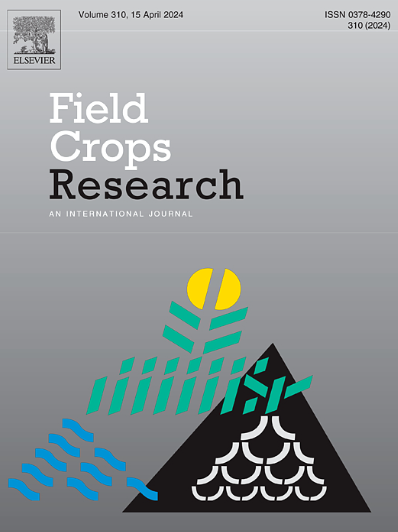缓解土壤酸化对于减少温室气体排放和改善土壤质量、作物产量和农业经济效益至关重要:来自全球荟萃分析的证据
IF 5.6
1区 农林科学
Q1 AGRONOMY
引用次数: 0
摘要
土壤酸化是作物生产力和生态系统健康的主要威胁,可通过土壤改良剂有效缓解。然而,仍然缺乏对土壤酸化减缓对作物产量、土壤性质和温室气体(GHG)排放的影响的全面评估。本研究采用279篇出版物的现场数据进行meta分析。结果表明:酸性土壤改进剂显著提高了土壤pH值6.27 %,碱饱和度86.1 %,阳离子交换容量19.5 %,土壤交换性酸性和铝分别降低了54.2% %和64.4 %。此外,管理还使有机质含量提高17.7% %,交换性钙和镁含量分别提高102% %和81.5% %。同时,土壤细菌、真菌数量平均增加36.2% %、15.9% %,微生物生物量碳、氮平均增加38.3% %、45.3% %。土壤酸化减少使CO2排放量增加27.1% %,N2O和CH4排放量分别减少20.6% %和12. %。土壤初始性质、气候和土壤输入类型是酸化控制的主要调节因子,其作用在强酸性、粗质、低有机质土壤和湿润气候条件下更为明显。增加土壤pH值可提高水稻产量(8.95 %)至油菜籽产量(82.6 %),并减少温室气体排放,通过增加作物产量、固定碳和减少温室气体排放,可获得798美元/公顷的收益。总之,缓解土壤酸化可显著促进粮食安全,减缓气候变化挑战。本文章由计算机程序翻译,如有差异,请以英文原文为准。
Mitigation of soil acidification is critical for reducing GHG emission and improving soil quality, crop yield and farm economic benefits: Evidence from a global meta-analysis
Soil acidification is a major threat to crop productivity and ecosystem health, which can be effectively mitigated by soil amendments. However, a comprehensive assessment of the impact of soil acidification mitigation on crop yield, soil properties, and greenhouse gas (GHG) emissions remains lacking. In this study, a meta-analysis was conducted by using field data obtained from 279 publications. The results showed that acidic soil amendment significantly increased soil pH by 6.27 %, base saturation by 86.1 %, cation exchange capacity by 19.5 %, and decreased soil exchangeable acidity and aluminum by 54.2 % and 64.4 %. In addition, the management also increased the organic matter content by 17.7 %, exchangeable calcium and magnesium by 102 % and 81.5 %. Meanwhile, the soil bacteria, fungi number increased by 36.2 %, 15.9 %, and microbial biomass carbon and nitrogen increased by 38.3 % and 45.3 % on average. Reduction in soil acidification increased CO2 emission by 27.1 %, but decreased N2O emission and CH4 emission by 20.6 % and 12.3 %, respectively. The initial soil properties, climate, and the type of soil inputs were the major regulators of acidification control, and their effects were more pronounced in strongly acidic, coarse, low OM soils and in humid climate. Increasing soil pH improved yield varying from 8.95 % in rice to 82.6 % in rapeseed and decreased GHG emissions, returned a revenue gain of 798 USD ha−1 through crop yield increase, carbon fixation and GHG emissions reduction. In conclusion, soil acidification mitigation significantly boosts food security and abates climate change challenges.
求助全文
通过发布文献求助,成功后即可免费获取论文全文。
去求助
来源期刊

Field Crops Research
农林科学-农艺学
CiteScore
9.60
自引率
12.10%
发文量
307
审稿时长
46 days
期刊介绍:
Field Crops Research is an international journal publishing scientific articles on:
√ experimental and modelling research at field, farm and landscape levels
on temperate and tropical crops and cropping systems,
with a focus on crop ecology and physiology, agronomy, and plant genetics and breeding.
 求助内容:
求助内容: 应助结果提醒方式:
应助结果提醒方式:


